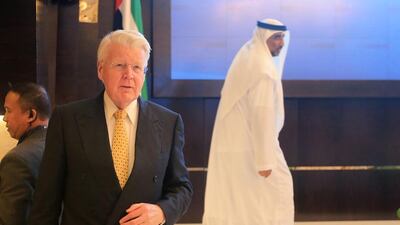ABU DHABI // The Middle East should start looking at the Arctic model to settle conflicts and find peace in the region, said the president of Iceland.
Dr Olafur Ragnar Grimsson, the country’s fifth president, said information technology and social media were gaining regional and global momentum but a clean energy transformation could help countries to build a sound future.
“By looking at the Arctic model, I think that the Emirates and the region can hopefully find an inspiration that your part of the world doesn’t necessarily have to be so,” he said on Wednesday during a lecture entitled “The Clean Energy Economy: A Road to Recovery from a Financial Crisis” at the Emirates Centre for Strategic Studies and Research. “Already, countries in the Himalaya region are looking at the Arctic model, some of which are nuclear powers.”
He said change and peace were possible and conflicts could be replaced by cooperation, even in the most militarised part of the world. “For more than 50 years, my part of the world saw the most extensive military build-up anywhere in the world during the Cold War,” Dr Grimsson said. “Now, 15 to 20 years after the Cold War ended, the northern regions have become one of the most cooperative, stable and peaceful parts of the world. From my generation, where every part of our political training and thinking was dominated by this military tension, to see this transformation in just over a decade is monumental proof that regions can be transformed from military conflict and hostile stand into a region of cooperation and peace.”
He said the vision of peace and cooperation was practical politics. “It’s not naive,” he said. “Trust the people – the ordinary people – because their inner wisdom is a better guide to a strong, peaceful, sustainable future than clever strategies. We should be guided by the wisdom of the ordinary people.”
Social media has empowered individuals, Dr Grimsson said, to challenge established institutions, such as during the Arab Spring.
“When protests gained momentum in Iceland in autumn 2008, the internet served as the rallying instrument,” he said. “This powerful instrument, which wasn’t even created five years ago, means that any leader now has to face a situation where democratic empowerment of anyone can challenge policies in a way that has never been possible before. It puts us in a completely new situation and most of us have not fully comprehended the implication of this.”
He said it was only the beginning of a fundamental global paradigm shift, but that the adoption of a clean energy transformation could help in the future.
“Clean energy transformation is not only a safeguard to financial crises in the future to come but it can also build a broad and profitable basis to a successful 21st-century economy,” Dr Grimsson said. “There are examples all over the Middle East that this transformation can be executed. Abu Dhabi found geothermal resources which might be sufficient to allow you to have the cooling system in your houses, driven by localised geothermal sources. We can come together in this profitable clean energy transformation in different parts of the world.”
Iceland is in discussions with Masdar to use clean energy to dry food products to enhance food security. “The UAE is taking this model forward of how we can make the single most important contribution to enhance food security in the world by modernising, based on solar, wind and geothermal [ways] of drying food,” he said.
cmalek@thenational.ae

